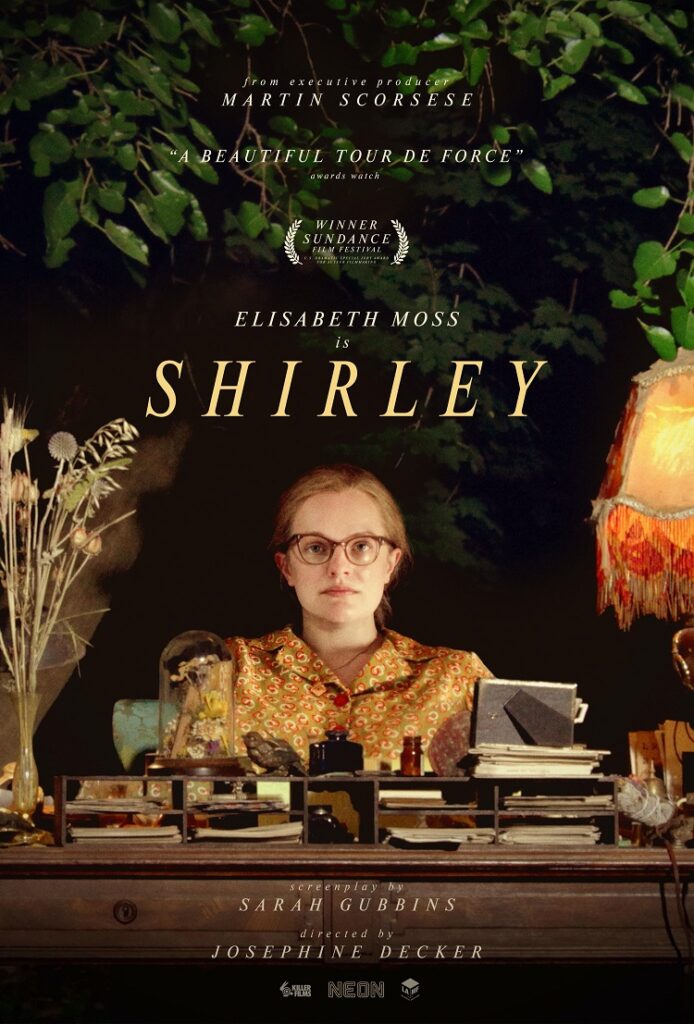
Shirley Jackson (Elisabeth Moss) has just become one of the most talked-about writers of her time, with the publishing of her short story, The Lottery, in The New Yorker. It attracts the attention of many, including Rose (Odessa Young), who, along with her husband, Fred (Logan Lerman), is traveling to go live with Jackson and her husband, college professor Stanley Hyman (Michael Stuhlbarg). The young couple is looking to start a new life together, as Fred has just recently accepted a part-time position as Stanley’s teacher’s assistant.
You’re probably thinking that this is just another biopic of a beloved author and those around her during a certain time frame. In a sense, yes, but it also isn’t. While based on a real person, the film is adapted from a 2014 Susan Scarf Merrell novel of the same name. Yes, in real life, she was married to Stanley Hyman – a literary critic and college professor who didn’t believe in monogomy. But there is no mention of the four children they had, one of whom was born before the publication of The Lottery. And though the movie doesn’t give an exact timeline, Merrell’s book was set in 1964, one year prior to Jackson’s death. So there is certainly some artistic licensing taking place here, and that’s perfectly fine.
You’re probably also thinking that this is going to turn out to be not what Rose and Fred anticipated, and you’d be right. There are certain traps in which Shirley is unable to avoid in the world of storytelling. But the way director Josephine Decker lays it all out shows that she’s not going for formula, and, instead, is going more for something more. And that something more results in a delicate piece of gothic-style filmmaking – which is apt for the author of The Haunting of Hill House.
When Rose and Fred arrive at the home of Stanley and Shirley, they are both welcomed with open arms by the professor, while his more-famous novelist wife is reclusive and not quite as greeting of a person. There’s a sense of jealousy witnessed in Shirley’s look at the young couple, and how their happy marriage is something missing from her life. The film’s opening train ride scene proves that Rose is the more adventurous of the two, while Fred is the more oblivious.
Shirley hasn’t left the house in months, which Stanley attributes to her failing health. But it’s also due to her agoraphobic nature, the roadblock she’s hit with trying to pen her new novel, and her husband’s toxic empowerment. Sure, he wants her to succeed, and he wants her to get back to her writing, but he’s also one to put more attention on the girls at the college at which he teaches than his own wife.
Their marriage isn’t anything ideal, and Fred and Rose both witness the two making sometimes crude remarks toward each other. While the men are spending most of the time at the college, Rose and Shirley grow closer to each other, and Rose becomes not only an assistant, but also somewhat of a muse. Shirley’s latest idea for a book revolves around the case of a missing college girl – which, in reality, would become Hangsaman.
Decker places most of the film indoors and effectively captures the feeling of isolation and being trapped. The mind of a writer can be swirling with ideas, but none can come out to paper, and that feeling won’t escape. In turn, Decker also exceptionally displays a crumbling relationship and how nothing can change it. We not only see this in Shirley and Stanley, but we also witness it in Rose and Fred – who start off vibrant and happy but then later start to resent each other and question their decision to get married.
Cinematographer Sturla Brandth Grøvlen’s camerawork recreates a haunting-like atmosphere, one that is unsettling and rife with dread. It’s the perfect look for a horror film, even though Shirley can’t exactly be classified as one – or at least one that fills all the checkboxes. It’s a horror film in the sense that the viewer is trapped in a house, and there’s an uneasy feeling throughout. But that’s mostly caused by the strained relationships that occupy the film.
As the titular character, Moss is outstanding, giving the best performance so far in her career – and one that guarantees a slot in the Best Actress category come award season. It’s a role that calls for a lot, in order for the viewer to understand the psychological downfall of someone who is at the height of success. There’s a perfect scene that truly captures the agoraphobic nature that involves Shirley at a cocktail party, and she purposefully spills wine on a couch.
One would think that for such a strong performance, especially for someone who is playing the film’s main character, the other actors surrounding that person wouldn’t be able to hold their own weight. That is not true in the case of Shirley. The others that occupy the screen are able to excel in their roles, especially the always reliable Stuhlbarg as her husband. Young is terrific as the always curious and adventurous Rose, who takes a liking to being with Shirley, despite her state of mind. Lerman is fine as Fred, but there isn’t as much depth with his character as there are the others.
Mixing both truth and fiction together, Shirley serves as one of the better semi-biopics to come out in recent memory. Decker’s film is an expertly crafted look into the mind of one of the most beloved authors of the 20th century, and also serves as an excellent piece on the frustrations of writer’s block and on the damaging effects of agoraphobia and depression.
Shirley will release to Hulu and Virtual Cinemas on June 5.